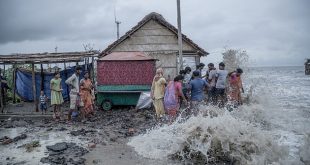The Senate voted 38-29 to provide tens of millions of ladies entry to authorized terminations below a brand new regulation supported by President Alberto Fernández. The margin was anticipated to be a lot smaller.
Huge crowds of abortion rights activists and anti-abortion campaigners gathered exterior the Palace of the Argentine Nationwide Congress to await the outcomes, which got here within the early hours of the morning after an in a single day debate. Supporters of the invoice greeted the information with loud cheers — and, in some circumstances, tears of pleasure.
Gabriela Giacomelli, whose two sisters had unlawful abortions, referred to as the scene “very emotional.”
“We now have been combating for years,” Giacomelli stated. “I see younger individuals now, although I hope they by no means need to abort, but when they do now they’ll do it safely.”
Mariela Belski, govt director of Amnesty Worldwide Argentina and an envoy for the worldwide girls’s rights motion She Decides, stated: “At the moment, Argentina has made an emblematic step ahead in defending the rights of ladies, women and other people with reproductive capability.”
The regulation will legalize abortion in all circumstances as much as 14 weeks of being pregnant. Abortion in Argentina, South America’s third-most populous nation, is at the moment solely permitted when a being pregnant outcomes from rape or endangers the life or well being of the lady.
In all different circumstances, abortion is prohibited and punishable by as much as 15 years in jail.
Abortion advocates hope Argentina’s choice will spur related actions in Latin America’s different Catholic-majority states.
Belski stated that the transfer sends “a robust message of hope to our total continent — that we will change course in opposition to the criminalization of abortion and in opposition to clandestine abortions, which pose severe dangers to the well being and lives of tens of millions of individuals. Each the regulation handed by the Argentine Congress at the moment and the large effort of the ladies’s motion to attain this are an inspiration to the Americas, and to the world.”
Against this, El Salvador, the Dominican Republic, Haiti, Honduras, Nicaragua and Suriname ban abortions in practically all circumstances. Colombia, Costa Rica, Guatemala and Panama enable for abortion provided that it is to protect the lady’s well being or assist save her life.
‘Troubling numbers’
Abortion has lengthy been a divisive problem in Argentina, and the vote galvanized activists on either side of the controversy.
Abortion rights advocates wore inexperienced handkerchiefs in a motion that turned often known as the inexperienced wave. Anti-abortion activists wearing blue — the colour of the “save each lives” motion, and that of the nationwide flag.
Anti-abortion activist and scholar Agostina López, 20, who protested in opposition to the invoice on Tuesday, advised CNN forward of the vote that it signified “a whole lack of values reminiscent of respect for all times and for girls.”
“With out the proper to life not one of the different rights make sense,” López stated, including that if the regulation handed, it might give a “false message that the killing of harmless infants is not a severe (matter).”
Brenda Austin, one in all 4 congresswomen who launched the 2018 invoice, stated she obtained Wednesday’s information with “nice emotion,” including that the choice is a “historic debt that our democracy owes to the rights of ladies.”
In latest months, the abortion rights motion obtained an enormous increase from the assist of President Fernández, who got here to energy final December.
In a recorded handle shortly earlier than his inauguration, Fernández pledged to “put an finish to the criminalization of abortion.”
Sporting a inexperienced tie — a logo of the abortion rights motion — Fernández stated criminalizing the process unfairly punishes “susceptible and poor girls,” including they have been the “the best victims” of Argentina’s authorized system.
“The criminalization of abortion has been of no use,” he stated, noting that it “has solely allowed abortions to happen clandestinely in troubling numbers.”
Fernández stated greater than three,000 individuals had died from unlawful abortions since 1983. No official figures can be found for what number of unlawful abortions happen in Argentina, however the Nationwide Well being Ministry estimates that between 371,965 and 522,000 procedures are carried out yearly.
Citing Nationwide Well being Ministry knowledge, the HRW report discovered that 39,025 girls and women have been admitted to public hospitals for well being points arising from abortions or miscarriages, and greater than 6,000 have been aged between 10 and 19.
Consultants say the brand new regulation will enable 13- to 16-year-olds with regular pregnancies to entry abortion providers and not using a guardian. Docs will nonetheless have the choice to “rigorously object” to performing abortions, though the regulation states they should discover one other physician to take action.
The invoice additionally makes use of inclusive language acknowledging that not all individuals who grow to be pregnant determine as girls.
Camila Fernandez, a self-identifying transgender lady, who was instrumental within the push for the invoice’s language that reads “individuals with skill to be pregnant,” advised CNN that youth and the LGBTQ group have been instrumental in difficult an “grownup centrist and patriarchal energy that has perpetuated privileges and injustices.”
“Hand in hand with trans males and non binary individuals we conquered the rights that at the moment are theirs and ours,” she stated, including that she believes the transfer will pave the way in which for added reforms for trans individuals who have been traditionally sidelined.
A divisive marketing campaign
The abortion debate has created stress in a rustic with deep Catholic ties.
Argentina’s structure cements authorities assist for the Catholic Church and acknowledges Roman Catholicism because the official faith. Nonetheless, a 1994 modification eliminated the requirement that the president have to be Catholic.
In November, Francis weighed into the controversy, encouraging the anti-abortion group Mujeres de las Villas to “transfer ahead” with their work.
In a handwritten letter addressed to congresswoman and group middleman Victoria Morales Gorleri, Francis stated “the issue of abortion is just not primarily a query of faith, however of human ethics, at the beginning of any non secular denomination.”
“Is it honest to get rid of a human life to resolve an issue? Is it honest to rent successful man to resolve an issue?” he wrote.
On Wednesday, the Senate additionally handed a complimentary invoice that may strengthen the social and financial security web for pregnant people going through financial hardships who need to proceed their pregnancies.
The “1,000 day plan” will strengthen providers from being pregnant as much as the primary 1,000 days of a kid’s life.
 Top Naija News – Nigeria News, Nigerian News & Top Stories Top Naija News – Nigerian Newspapers, Nigerian News. topnaijanews is a daily Nigerian newspaper covering Latest News, Breaking News, Entertainment, Sports, Lifestyle and Politics.
Top Naija News – Nigeria News, Nigerian News & Top Stories Top Naija News – Nigerian Newspapers, Nigerian News. topnaijanews is a daily Nigerian newspaper covering Latest News, Breaking News, Entertainment, Sports, Lifestyle and Politics.




